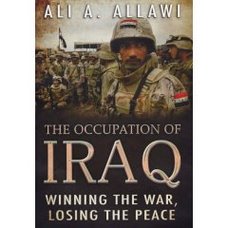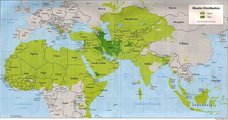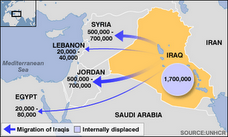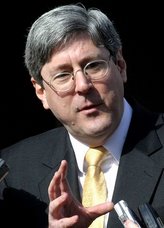 Ashley Gilbertson for The New York Times
Ashley Gilbertson for The New York TimesBAGHDAD, March 25 — The senior American envoy in Iraq, Ambassador Zalmay Khalilzad, held talks last year with men he believed represented major insurgent groups in a drive to bring militant Sunni Arabs into politics.
Mr. Khalilzad’s willingness even to approach rebel groups seemed at odds with the public position of some Bush administration officials that the United States does not negotiate with insurgents.... In general, Mr. Khalilzad was given great flexibility in making diplomatic decisions to try to rein in the spiraling violence, and his talks with insurgents reflected the practical view of Iraqi politics that the ambassador adopted throughout his nearly two-year tenure here.
In another sign of pragmatism, the ambassador reiterated in the interview his position that the American and Iraqi governments had to consider granting amnesty to insurgents. “This is something that we and Iraqis, the government, will do together, and there are various types of amnesties,” he said. “But the fundamental point, the goal of bringing the war to an end, the most important tribute we could pay to our soldiers who have lost their lives here would be that the cause they fought for would be embraced and accepted by their former enemies, by those who fought them.”
....Mr. Khalilzad’s efforts to woo the Sunni Arabs have infuriated many politicians in the ruling Shiite bloc, including Prime Minister Nuri Kamal al-Maliki. Shiite leaders increasingly see the Americans as trying to check the power of the majority Shiites. That could push them closer to Iran, which is ruled by Shiite Persians.
After the Samarra bombing of February 2006, Mr. Khalilzad began saying that killings largely attributed to Shiite militias were more destabilizing than violence by Sunni insurgents.
Displeased with the hard-line Shiite attitude of Ibrahim al-Jaafari, then the prime minister, Mr. Khalilzad helped engineer Mr. Jaafari’s ouster, only to see Mr. Jaafari replaced by a party deputy, Mr. Maliki, who is beholden to the radical Shiite cleric Moktada al-Sadr.
Some Shiite leaders began calling Mr. Khalilzad by the Sunni nickname of “Abu Omar.”
“He didn’t transfer real power to the Iraqis,” said Hassan al-Sineid, a Shiite legislator and adviser to Mr. Maliki. “He wasn’t cooperative enough with the Iraqi government in any field.”
....Mr. Khalilzad and his colleagues, the critics say, were so fixated on meeting the political timetable laid out by the White House that they pushed through a document that may have inflamed the Sunni-led insurgency by enshrining strong regional control. The Constitution reaffirms Sunni Arab beliefs that Shiites and Kurds want oil and territory.
“The Constitution is the source of the problem,” said Fakhri al-Qaisi, a hard-line Sunni Arab politician who was among 15 Sunni advisers on the Constitution. “It’s a sectarian document.”
Western officials who have examined the Constitution say the Sunni Arabs have a right to be concerned: the document’s language skews authority vastly in favor of the regions.
http://www.kuwaittimes.net/read_news.php?newsid=OTU5MTQ2NDY=
Khalilzad leaves Iraq with nation on knife edge
Published Date: March 26, 2007 By Steven R Hurst AP
On his first day as US ambassador, Zalmay Khalilzad said Al-Qaeda in Iraq and Sunni insurgents wanted to start a civil war. He leaves his post this week with the US military and Iraqi security forces battling to prevent a sectarian conflagration in Baghdad.
"I have been very saddened and concerned that the level of violence has been as high, sectarian violence in particular has been a grave threat," said the 56-year-old envoy, who has been nominated by President George W Bush as the next US envoy to the United Nations. Khalilzad has deep conservative credentials and led the transition team at the Pentagon at the start of the first Bush administration.
US military deaths have fallen since the crackdown began Feb 14, but the percentage of US forces killed in Baghdad is up sharply as American troops vastly expand their presence on the streets of the capital.....Sunni and Al-Qaeda fighters have pulled off several spectacular bombings. The numbers are down slightly from pre-crackdown days, but the insurgents are still pulling off high-profile attacks. On Thursday, a Katyusha rocket slammed into the Green Zone about 50 yards from where UN Secretary-General Ban Ki-moon was holding a press conference with Al-Maliki. There were no serious casualties but videotape of Ban, ducking and looking frightened by the explosion, dominated television screens.
A day later, an insurgent suicide bomber got within feet of one of Iraq's two deputy prime ministers, Salam Al-Zubaie, wounding the top Sunni official seriously and killing nine others during Friday prayers at the private mosque attached to his home. While Khalilzad was able to persuade Al-Maliki to give American forces a free hand in the security operation and to keep the Mahdi Army largely out of sight, the US envoy has had a difficult relationship with the Iraqi leader. A particularly rough patch arose in October when Khalilzad and then-US commander Gen. George Casey held a news conference in which the ambassador laid out a series of timelines for political reform. Al-Maliki publicly rebuked Khalilzad, claiming he had not been consulted and that Washington was trying to impose its will on his government. At one point during the dispute Al-Maliki declared that while he was a friend of the United States, "I am not America's man in Iraq". That angry period was papered over through Khalilzad's diplomacy while Washington and Baghdad hammered out the details of the latest security crackdown. During past efforts to curb violence in the capital, Al-Maliki had regularly intervened on behalf of the Mahdi Army. This time he didn't.
....Ali al-Alaq, a senior lawmaker from Al-Maliki's Dawa Party, said Khalilzad was biased in favour of fellow Sunnis: "We hope the new ambassador will be more even-handed with all Iraq's sects." But Barham Salah, one of two deputy prime ministers and a Kurd, whose people have benefited greatly from the American presence, saw it otherwise: "At times, he seemed to care for the success of the new Iraq more than some Iraqi leaders did and he leaves with the admiration of Iraqis, even those he disagreed with." -- AP





No comments:
Post a Comment